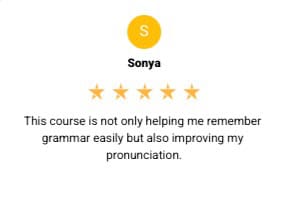How to Become a Confident Speaker of English
👇 Take this lesson with you! 👇
Table of Contents
Introduction
Myth: Confidence is something you either have or you don’t.
Reality: Confidence is a skill that can be developed.
If you’re an adult English student, especially one preparing for the IELTS Speaking test, you may be feeling unconfident about your speaking skills. This is perfectly normal. Many people feel nervous about speaking English, even native speakers sometimes.
The good news is that there are a number of things you can do to develop your confidence and become a more comfortable and confident speaker of English.
Why do we lack confidence?
There are a few common reasons why people lack confidence when speaking English:
New situations
It’s normal to feel nervous in new situations, especially if you’re not sure what to expect. If you’re speaking English in a new environment or with new people, it’s natural to feel a little bit of anxiety.
Unpreparedness
If you feel like you’re not prepared to speak English, it’s going to be difficult to feel confident. Make sure to practice speaking English regularly and to prepare for specific speaking tasks, such as the IELTS Speaking test.
Lack of tools
Some people lack the tools they need to handle their nerves and enxiety. This can include things like relaxation techniques, positive self-talk, and coping strategies.
There are a number of things you can do to build your confidence when speaking English. Let’s look at them next.
Build experience of speaking English
The more you speak English, the more confident you will become. Make an effort to speak English with as many people as possible, both online and offline. You can practice with classmates, family members, friends, or a speaking partner.
Start by practicing one-on-one, then move on to groups.
Practice with people below your level, this will help boost your confidence.
Be prepared
Be prepared for specific speaking tasks. If you are joining a speaking group, do some preparation around the topic that is being discussed.
If you are taking the IELTS Speaking test, get familiar with the topics, questions and strategies so you can speak better in the test.
These will help you to feel more confident and in control.

Set small goals
Becoming a native speaker is not the goal; becoming a confident English speaker is.
When it comes to your English speaking practice, set achievable goals such as the ones below:
1) Join a speaking group or language exchange.
2) Once you have joined, start by listening for a minute, then gradually participate for longer periods.
3) In the second session, introduce yourself confidently, regardless of the level of fluency you aim to achieve.
Develop tools to build confidence
Use the ‘Strong First Line’ approach
In any situation, begin your conversations with a strong opening line to set a positive tone.
Accept your nerves
Accept that nervousness is natural, so when you feel nervous, don’t fight it, accept and just feel the nerves. Let them be. Practice mindfulness to stay in the moment during interactions.
Use positive self-talk
This is an essential part of your mindset when speaking English and especially when doing exams like IELTS Speaking.
When you hear the voice in your head say, ‘I can’t do this’, just notice it, and then say to yourself,
Maybe I can do this.
This is going to be exciting.
Whatever happens is ok.
I am going to enjoy this.
Focus on communication, not perfection
Many students try to speak perfect English every time, and then feel disappointed when the English that comes out of their mouth is not as good as the English in their head.
Let go of the need to speak perfect English, instead focus on communicating your ideas. The person you are speaking to will find it easier to follow you, and your conversations will flow more easily.
Embrace mistakes when speaking English
On a similar note, embrace your mistakes. Mistakes are stepping stones to improvement. Rather than fearing them, embrace and learn from them. Act on feedback from others and fine-tune your skills of noticing your mistakes through reading and listening.
Once you accept your mistakes, you will start to notice your confidence grow.

Avoid comparisons
Comparing your English to another person’s English is a sure way to destroy your confidence.
Resist the urge to compare yourself to others, especially native speakers. Everyone has their unique language journey. Focus on your progress and journey rather than comparing it to someone else’s.
Conclusion
Confidence in speaking English is not a predetermined trait; it’s a skill that can be honed over time. Remember, you have the power to develop your confidence by setting achievable goals, prioritising communication over perfection, and equipping yourself with tools to conquer nervousness.
Break free from the myth and embark on your journey to becoming a confident English speaker, especially as you prepare for the IELTS Speaking test. Your confidence awaits—let it shine!
Improve your Speaking Skills with this Free Course
Crack IELTS Speaking Part 1
Learn to Speak with Confidence in Part 1 of Your IELTS Test!
⭐️⭐️⭐️⭐️⭐️
‘It’s such a great course. I’ve learned so many usages for speaking part 1.’
Zu Htet





